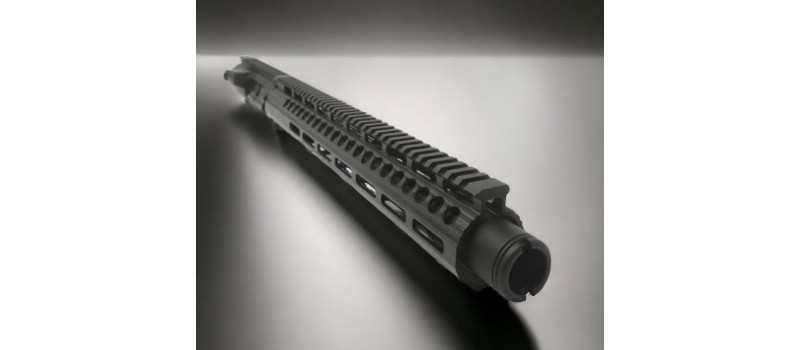When it comes to improving accuracy and control with a pistol, many shooters turn to the use of compensators and muzzle brakes. These attachments can make a significant difference in how a pistol performs, especially for beginners who may struggle with recoil and follow-up shots. But what exactly does a compensator do on a pistol? And how does a muzzle brake factor into the equation? In this beginner's guide, we will explore the functions and benefits of these two attachments and how they can help you maximize your accuracy with a pistol.
The Basics of Firearms: Understanding Terminology
To fully understand the functions and benefits of pistol compensators and muzzle brakes, it's important to start with the basics of firearms terminology. Whether you're a seasoned shooter or a beginner, having a solid grasp of key firearm terms will help you navigate the world of attachments and accessories.
One important term to understand is a muzzle brake. A muzzle brake is a device that attaches to the muzzle end of the firearm barrel and helps reduce felt recoil and muzzle rise. It redirects the gases expelled when a round is fired, reducing the amount of force that pushes the barrel upward during recoil. This results in improved control and faster follow-up shots.
Another key term is a compensator. While often used interchangeably with muzzle brakes, a compensator has a slightly different purpose. A compensator also attaches to the muzzle of the firearm, but its primary function is to reduce muzzle flip or vertical recoil. It achieves this by redirecting the gases upward, counteracting the force that would otherwise cause the barrel to rise.
Understanding these terms is crucial when considering the best attachments for your pistol. Whether you're looking for an AR pistol muzzle brake, an AR-10 muzzle brake, or a 300 blackout muzzle brake, having a solid understanding of firearm terminology will help you make informed decisions when selecting the right compensator or muzzle brake for your specific needs.
Demystifying the Role of a Compensator in Pistols
The role of a compensator in pistols is often misunderstood or overlooked by many shooters. But once you understand its purpose and how it works, you'll see why it's an essential attachment for maximizing accuracy and control.
A compensator, as we mentioned earlier, is a device that attaches to the muzzle end of the firearm barrel. Its primary function is to reduce muzzle flip or vertical recoil. When a round is fired, the gases expelled exert force on the barrel, causing it to rise. This can negatively impact your accuracy and slow down follow-up shots.
However, a compensator counteracts this force by redirecting the gases upward. This redirection helps to counterbalance the upward force, keeping the muzzle level and reducing the amount of recoil felt by the shooter. As a result, you'll experience less muzzle rise, which translates to improved control and faster follow-up shots.
Whether you're shooting an AR pistol, an AR-15, an AR-10, or even a pistol chambered in 300 blackout, adding a compensator can make a significant difference in your shooting experience. Not only will it enhance your accuracy, but it will also help you feel more confident and in control of your firearm.
Why Should You Consider Adding a Compensator to Your Pistol?
Adding a compensator to your pistol can have a profound impact on your shooting experience. Whether you're shooting an AR-15, an AR-10, or even a pistol chambered in 300 blackout, a compensator can greatly enhance your accuracy and control. Here's why you should seriously consider adding this essential accessory to your firearm.
First and foremost, a compensator helps to reduce muzzle flip or vertical recoil. When a round is fired, the gases expelled exert force on the barrel, causing it to rise. This can throw off your aim and make follow-up shots slower and more difficult. However, with a compensator in place, the gases are redirected upward, counteracting the upward force and keeping the muzzle level. This translates to improved control and faster follow-up shots, allowing you to maintain your accuracy and stay on target.
In addition to recoil reduction, a compensator also helps to mitigate felt recoil. The redirection of gases helps to dissipate some of the energy and reduce the kickback experienced by the shooter. This means less muzzle rise and less of a jarring sensation when firing your pistol.
Furthermore, a compensator can also enhance your shooting confidence. With reduced recoil and muzzle rise, you'll feel more in control of your firearm and be able to focus on your accuracy. This can lead to increased confidence in your abilities and ultimately better shooting performance.
Muzzle Brakes vs. Compensators: A Comparative Analysis
Muzzle brakes and compensators are often discussed in the same breath, but they actually serve different purposes when it comes to improving pistol performance. In this section, we'll compare and contrast these two attachments to help you understand their differences and make an informed decision for your firearm.
First, let's talk about muzzle brakes. Designed to reduce felt recoil and muzzle rise, muzzle brakes are essential for shooters who want better control and faster follow-up shots. Whether you're shooting an AR-15, an AR-10, or a pistol chambered in 300 blackout, adding a muzzle brake can significantly enhance your shooting experience. These attachments redirect the gases expelled when a round is fired, reducing the force that pushes the barrel upward during recoil. This means less muzzle rise, improved control, and ultimately, better accuracy.
On the other hand, compensators have a slightly different purpose. While they also attach to the muzzle of the firearm, compensators primarily focus on reducing muzzle flip or vertical recoil. By redirecting the gases upward, compensators counteract the force that would otherwise cause the barrel to rise. This leads to less recoil felt by the shooter, enhanced control, and faster follow-up shots.
Choosing the Right Compensator for Your Firearm
Choosing the right compensator for your firearm is an important decision that can greatly impact your shooting experience. Whether you're shooting an AR-15, an AR-10, or a pistol chambered in 300 blackout, finding the right compensator will help you maximize accuracy and control.
One important factor to consider when choosing a compensator is the specific firearm you are using. Different firearms may require different types of compensators to achieve optimal results. For example, if you are shooting an AR-15, you will want to look for an AR-15 muzzle brake specifically designed for that platform. The same goes for an AR-10 or a pistol chambered in 300 blackout - you'll want to find a muzzle brake specifically designed for those firearms.
Another factor to consider is the purpose you want to achieve. Are you looking to reduce muzzle flip, minimize recoil, or both? Some compensators are designed with a focus on one specific function, while others may offer a combination of benefits. Take the time to research and read reviews to find the compensator that best suits your needs.
Additionally, consider factors such as weight, material, and ease of installation. The weight of the compensator can affect the overall balance of your firearm, so choose one that works well with your specific setup. The material used can impact durability and longevity, so opt for a high-quality material such as stainless steel or titanium. Finally, make sure the compensator is easy to install or that you have access to a professional who can assist you.
Choosing the right compensator for your firearm may take some time and research, but it is a worthwhile investment. By finding the perfect match, you'll be able to maximize accuracy, improve control, and ultimately enhance your shooting experience. So take the time to choose wisely and unlock the full potential of your firearm.
Top Tips for Installing and Maintaining Your Pistol's Compensator
Installing and maintaining your pistol's compensator is essential to ensuring optimal performance and longevity. Here are some top tips to help you navigate the process:
1. Read the manufacturer's instructions: Before installing your compensator, carefully read and follow the manufacturer's instructions. Each compensator may have specific installation requirements, and deviating from these instructions could affect its effectiveness and even void any warranty.
2. Seek professional assistance if needed: If you're unsure about the installation process or lack the necessary tools, it's best to seek professional assistance. Gunsmiths or firearm experts can ensure proper installation and minimize the risk of any damage to your firearm.
3. Check compatibility: Ensure that the compensator you choose is compatible with your specific firearm, whether it's an AR-15, an AR-10, or a pistol chambered in 8.6 blackout. Using the wrong compensator can affect performance and safety.
4. Regular cleaning and maintenance: Like any firearm accessory, your compensator will require regular cleaning and maintenance. Follow proper cleaning procedures, including using appropriate cleaning solvents and brushes, to keep your compensator in top shape.
5. Inspect for wear and tear: Regularly inspect your compensator for signs of wear and tear. Check for any loose or damaged parts, and address any issues promptly to avoid potential malfunctions.
By following these top tips for installing and maintaining your pistol's compensator, you'll ensure optimal performance and longevity. Remember, a properly installed and well-maintained compensator can greatly enhance your accuracy and control, helping you get the most out of your shooting experience.
Common Misconceptions About Compensators and How to Overcome Them
When it comes to pistol compensators, there are some common misconceptions that can lead shooters astray. One misconception is that compensators are only necessary for competition shooters or advanced shooters. In reality, compensators can benefit shooters of all skill levels. Whether you're a beginner or an experienced shooter, a compensator can greatly improve your accuracy and control, making it easier to stay on target and fire faster follow-up shots.
Another misconception is that all compensators are the same. While they may look similar, not all compensators are created equal. Different compensators have different designs and features that affect their performance. For example, an AR-15 muzzle brake may not be the best choice for a pistol chambered in 300 blackout. It's important to do your research and choose a compensator that is specifically designed for your firearm.
Lastly, some shooters believe that a compensator will completely eliminate recoil. While a compensator can significantly reduce recoil and muzzle rise, it cannot eliminate it entirely. It's important to have realistic expectations when using a compensator and understand that there will still be some recoil. However, with a well-designed compensator, you can greatly mitigate recoil and make shooting more comfortable and controllable.
To overcome these misconceptions, it's important to educate yourself and understand the true capabilities and benefits of compensators. Research different models, read reviews, and consult with experts to find the right compensator for your specific needs and firearm. By doing so, you'll be able to maximize your accuracy and control with a compensator that is tailored to your shooting style and preferences.
Maximizing Accuracy with Pistol Compensators: Real-Life Examples and Success Stories
Now that we've covered the basics of pistol compensators and muzzle brakes, let's dive into some real-life examples and success stories of shooters who have maximized their accuracy with these attachments.
One shooter, John, was struggling with recoil and muzzle rise while shooting his AR-10. After adding a specially designed AR-10 muzzle brake to his firearm, he noticed an immediate improvement in his accuracy and control. The muzzle brake effectively reduced muzzle rise, allowing him to stay on target and fire faster follow-up shots. John's confidence soared, and he began consistently hitting his targets with precision.
Another shooter, Sarah, had a pistol chambered in 300 blackout. She found it difficult to control the recoil and maintain accuracy, especially during rapid fire. After researching and selecting a 300 blackout muzzle brake, Sarah was amazed at the difference it made. The muzzle brake minimized recoil, making her pistol feel more comfortable to shoot. She quickly became more accurate and confident in her shooting abilities.


